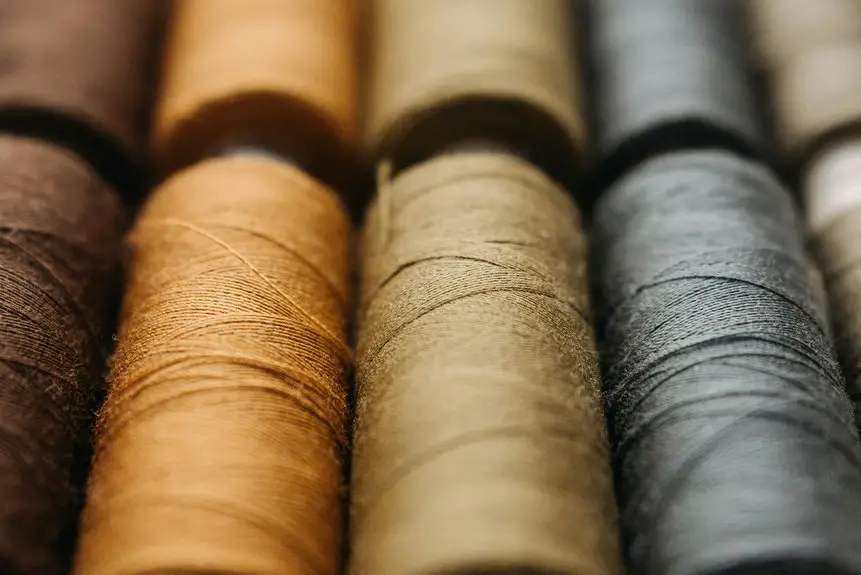Imagine a small business owner crafting face masks from tightly woven cotton, providing both comfort and protection for her community. But with so many fabric options available, how do you determine which natural materials are the most effective? By exploring the filtering efficiency, breathability, and skin benefits of various fabrics, you can make an informed decision for your own mask-making endeavors. Let’s uncover what truly sets these materials apart.
Table of Contents
Key Takeaways
- Cotton is a popular choice due to its effective filtration and comfort, especially in tightly woven forms or layered combinations.
- Linen offers good breathability and filtration, making it suitable for warm weather wear while maintaining comfort.
- Bamboo fabric is naturally antibacterial, moisture-wicking, and highly breathable, ideal for sensitive skin.
- Hemp provides high antimicrobial properties and requires minimal water and pesticides, supporting sustainability.
- Combining different natural fabrics, like cotton with linen or bamboo, enhances both filtration efficiency and comfort.
Filtering Efficiency of Natural Fabrics
When it comes to filtering efficiency, natural fabrics like cotton and linen can be surprisingly effective for face masks.
These materials often trap airborne particles better than synthetic fabrics, thanks to their tightly woven fibers. You’ll find that cotton, especially when layered, can block droplets and larger particles effectively.
Natural fabrics like cotton excel in trapping airborne particles due to their tightly woven fibers, especially when layered.
Linen also offers good filtration while remaining breathable.
To maximize efficiency, consider using a combination of these natural fabrics, as layering can enhance filtration without compromising comfort.
You’ll want to pay attention to the fabric’s weight and weave; denser fabrics generally provide better filtration.
Comfort and Skin Benefits
When choosing a face mask, comfort is just as important as protection.
Natural fabrics offer hypoallergenic options, ensuring they’re gentle on your skin.
Plus, their softness and moisture control features keep you feeling fresh throughout the day.
Hypoallergenic Material Choices
Although many masks are made from synthetic materials, opting for hypoallergenic natural fabrics can greatly enhance comfort and provide skin benefits.
These materials are less likely to irritate your skin and can help prevent allergic reactions. Here are some great hypoallergenic choices for your face mask:
- Organic Cotton: Soft, breathable, and gentle on sensitive skin.
- Bamboo Fabric: Naturally antibacterial and moisture-wicking, keeping your skin dry.
- Linen: Lightweight and highly breathable, perfect for warm weather.
Choosing these materials not only boosts comfort but also contributes to healthier skin.
When you guarantee your mask is hypoallergenic, you can wear it for longer periods without discomfort, making it an excellent choice for daily use.
Softness and Comfort
Choosing hypoallergenic materials like organic cotton, bamboo, and linen not only enhances skin compatibility but also guarantees softness and comfort. When you wear a mask, you want something gentle against your skin. Here’s a quick look at the comfort levels of these natural fabrics:
| Fabric | Softness Level |
|---|---|
| Organic Cotton | High |
| Bamboo | Very High |
| Linen | Moderate |
| Hemp | Moderate |
| Tencel | Very High |
These fabrics feel great on your skin, reducing irritation and discomfort during extended wear. You’ll appreciate how breathable and cozy they are, making your mask experience much more enjoyable. Prioritizing softness and comfort will help you feel at ease while keeping safe.
Moisture Control Features
Natural fabrics excel in moisture control, ensuring your skin stays comfortable and healthy while wearing a mask. Opting for materials like cotton, linen, or hemp can help you manage sweat and humidity effectively.
Here’s why these natural fabrics are a great choice:
- Breathability: Natural fibers allow air circulation, preventing overheating and discomfort.
- Absorbency: They wick moisture away from your skin, keeping you dry and irritation-free.
- Antimicrobial properties: Some natural fabrics possess inherent qualities that help reduce bacteria buildup, promoting skin health.
Breathability and Airflow
When you wear a face mask, breathability and airflow are essential for comfort and effectiveness. Natural fabrics like cotton and linen are great choices because they allow air to circulate, making it easier for you to breathe.
These materials provide a balance between filtration and comfort, ensuring you don’t feel suffocated during extended wear. Avoid synthetic fabrics, as they often trap heat and moisture, leading to discomfort.
Natural fabrics strike a perfect balance between filtration and comfort, preventing suffocation during long wear while avoiding the discomfort of synthetic materials.
If you’re making your own mask, consider using multiple layers of breathable material; this can enhance filtration without sacrificing airflow. You’ll find that a well-designed mask made from natural fibers will keep you cool, comfortable, and protected throughout the day.
Choosing the right fabric can make all the difference in your mask-wearing experience.
Sustainability and Environmental Impact
When choosing natural fabrics for your face masks, you’re not just considering comfort and style; you’re also making a more sustainable choice.
By opting for renewable materials, you help reduce reliance on synthetic fibers that harm the environment.
Plus, using fewer chemicals and cutting down on waste can greatly lessen your ecological footprint.
Renewable Material Sources
While many materials used in face masks are derived from non-renewable sources, opting for renewable fabric alternatives can considerably reduce environmental impact.
By choosing fabrics that come from sustainable sources, you contribute to a healthier planet. Here are a few renewable options to evaluate:
- Organic Cotton: Grown without harmful pesticides, it’s biodegradable and soft on your skin.
- Bamboo: Fast-growing and requires minimal water; it’s naturally antibacterial and breathable.
- Hemp: Needs little water and no pesticides, plus it enriches the soil as it grows.
These renewable materials not only provide effective protection but also help you make a positive statement about sustainability.
Choosing wisely can lead to a more eco-friendly lifestyle without sacrificing quality or comfort in your face masks.
Reduced Chemical Usage
Choosing natural fabrics for face masks not only benefits the environment but also minimizes the chemical exposure that often comes with synthetic materials.
Many synthetic fabrics are treated with harsh chemicals, which can irritate your skin and even cause allergic reactions. By opting for natural fibers like cotton, linen, or hemp, you’re reducing your contact with these potentially harmful substances.
Natural fabrics are typically grown and processed with fewer chemicals, making them a safer choice for you and the planet. Plus, they tend to be more breathable and comfortable, enhancing your overall experience when wearing a mask.
Making this simple switch can help you support sustainable practices while protecting your health from unwanted chemicals.
Waste Reduction Benefits
Natural fabrics not only reduce chemical exposure but also play a significant role in waste reduction. When you choose materials like organic cotton or linen for your face masks, you’re making a more sustainable choice that helps the environment.
Here’s how:
- Biodegradable: Natural fabrics break down more easily than synthetic ones, minimizing landfill waste.
- Recycled Materials: Many natural fabrics can be made from recycled textiles, giving new life to old materials.
- Local Sourcing: By opting for local natural fabrics, you reduce carbon emissions associated with transportation.
Antimicrobial and Hygiene Properties
When selecting fabrics for face masks, it is crucial to take into account their antimicrobial and hygiene properties. Natural fabrics like cotton, hemp, and bamboo offer excellent breathability and moisture-wicking features, but their ability to resist bacteria can vary. Choosing the right fabric can enhance protection while ensuring comfort.
| Fabric Type | Antimicrobial Properties | Recommended Use |
|---|---|---|
| Cotton | Moderate | Everyday masks |
| Hemp | High | Outdoor activities |
| Bamboo | High | Sensitive skin |
| Linen | Moderate | Casual wear |
| Silk | Low | Fashion masks |
Availability and Suitability for All Users
The right fabric for face masks not only impacts protection and comfort but also plays a role in accessibility for different users.
When choosing materials, consider these factors to guarantee everyone can find suitable options:
- Availability: Natural fabrics like cotton, linen, and hemp are widely available in stores and online, making them easy to source.
- Breathability: Users of all ages and sensitivities benefit from breathable fabrics that prevent discomfort during extended wear.
- Allergies: Selecting hypoallergenic materials is essential for those with sensitive skin or allergies, guaranteeing a comfortable fit for everyone.
Recommended Fabric Combinations
While selecting fabrics for face masks, combining different materials can enhance both protection and comfort.
Consider pairing a tightly woven cotton with a layer of soft flannel. The cotton acts as a barrier, while the flannel adds a cozy touch against your skin.
Alternatively, you might choose a cotton exterior for breathability and a silk interior for added comfort and moisture-wicking properties.
If you’re looking for extra filtration, a layer of cotton between two layers of linen can work well, as linen has natural antimicrobial properties.
Experimenting with these combinations guarantees you get a mask that feels good and provides adequate protection, keeping your health and comfort in mind.
Stay safe while looking stylish!
Care and Maintenance of Natural Fabrics
Taking good care of your natural fabric face masks will guarantee they last longer and maintain their protective qualities.
Proper care of your natural fabric face masks ensures they remain effective and durable over time.
Here are some essential care tips to keep in mind:
- Wash Regularly: Clean your masks after each use. Hot water and mild detergent work best to remove any germs.
- Air Dry: Instead of using a dryer, hang your masks to air dry. This helps prevent shrinkage and maintains fabric integrity.
- Store Properly: Keep your masks in a clean, dry place when not in use to avoid contamination.
Frequently Asked Questions
How Do I Choose the Right Fabric for My Face Mask?
To choose the right fabric for your face mask, consider breathability, durability, and filtration efficiency. Look for tightly woven materials, and test comfort by trying different fabrics against your skin before making a decision.
Can I Mix Different Fabrics for Better Mask Performance?
Sure, why not? Let’s throw a fabric party! Mixing fabrics can enhance your mask’s effectiveness, as long as you balance breathability and filtration. Just don’t invite stretchy spandex—it’s a terrible guest for this gathering!
Are There Any Specific Brands Recommended for Natural Fabrics?
You’ll find several brands that offer high-quality natural fabrics. Look for those specializing in organic cotton or linen, like Fabric.com or Spoonflower. They provide a variety of options perfect for your projects.
How Often Should I Wash My Natural Fabric Mask?
You should wash your natural fabric mask after each use or daily, especially if it’s been exposed to moisture or contaminants. Regular washing helps maintain its effectiveness and keeps it clean and safe for you.
What Are the Potential Allergies Related to Natural Fabrics?
Imagine your skin is a sensitive flower, reacting to natural fabrics like cotton or linen. Some folks might face allergies, experiencing irritation or rashes, so always test a small fabric piece before wearing it regularly.
- Removing Ink Stains From a Polyester Shirt - June 8, 2025
- How to Get Red Wine Out of a White Carpet - June 8, 2025
- The Ultimate Guide to Choosing Performance Fabrics for Specific Needs - June 8, 2025






